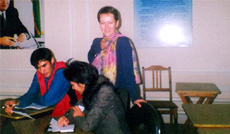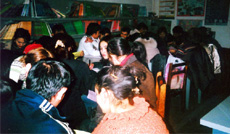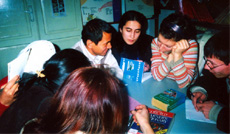Reading Club Results 2009
Dear friends,
Merry Christmas and Happy New Year!
Here you can find the list of all the topics we have had so far at the sessions of Reading Club project which I started in June, 2007. I always loved reading, and initially I had a wish to help others, first of all, teenagers, appreciate it as a unique way to discover the world around us as well as the world within us.
Although we have never been restricted in our choice of topics - we had sessions on Ancient Egypt and the modern Middle East, Nepal and African countries – most of the sessions were designed on the materials about people in the UK and the USA, their culture, their way of life, their history.
Another principle I try to observe is to use books belonging to our UzTEA Samarkand Resource Centre. Thanks to the British Council, Uzbekistan and the American Embassy in Uzbekistan we have a variety of books. My special thanks are to the staff of representative office of Macmillan Publishing House in Uzbekistan for beneficial collaborative work. Our readers always ask us for “something new from Macmillan” and whenever it is possible we purchase fiction, textbooks and dictionaries. Moreover, there were some private donations of books and I would like to thank Sue Leather, Diana Djingaryan and an American family whose name I do not know who donated books to our Resource Centre.
But it is not enough to have good resources for reading. It is necessary to know how to read a text. And it was one of aims of a seminar on Critical Thinking through reading which we held in July, 2009. In a feedback one of participants wrote that thanks to the seminar he became aware of importance of attentive and thoughtful reading. Another participant confessed that he was surprised to learn that there are some Universal Intellectual Standards and he thought these standards were to be followed by all people. And by the end of the 5-day seminar all the participants had come to the conclusion that the skill to think critically is of great significance for our life. Isn’t it a miracle?
Another miracle I have been a witness is also connected with the participants of Reading Club. You may notice that in 2007 and 2008 there were weeks when I did not run Reading Club sessions – these were days when I was not in Samarkand, but in 2009, even when I was away, sessions were conducted by participants themselves. They managed to overcome their fear to speak publicly, they found interesting materials, processed them, read and discussed the information with peers. Thank you, Yulduz, Knara, Khilola, Gozzal, Areva, Kamilya, Kirill, Sasha for your support and genuine interest in reading.
Some sessions in the list are typed in red, because they are very special for me. All of them are based on impressions and materials I brought from the USA. Two of the sessions are called America and its people, but I think it could be a title for all 12 sessions dedicated to America and those wonderful people I met there. You will find brief contents of the sessions and some of them are accompanied by photos I took during the sessions. Pay attention to the faces of participants – beautiful faces of thinking people. This is another miracle reading does.
I would like to finish my message with the news that two of our participants, Yulduz Usmanova and Javohir Murodov, have been engaged recently and in the upcoming year they are going to get married. They first met two years ago, in December 30, 2007 at the Reading Club session which was called Urban Legends and their story can become a plot of another urban legend. I am sure this is the greatest miracle Reading Club has ever worked. Do you agree?
With wishes of every success in 2010,
Yours,
Victoria Demidova
UzTEA Samarkand branch
UzTEA Samarkand branch Reading Club sessions 2007
date |
# |
name of a session |
June, 19 |
1. |
How to beat bullies |
June, 26 |
2. |
What is the perfect age? |
July, 3 |
3. |
Professional behaviors |
July, 10 |
4. |
Pirates of the Caribbean |
July, 17 |
5. |
What is plagiarism? |
July, 24 |
6. |
Behind the veil |
July, 31 |
7. |
Vox populi |
August, 7 |
8. |
Could you be a cirque performer? |
August, 14 |
9. |
Would you like a strawmato? |
August, 21 |
10. |
Egypt’s dazzling past |
August, 28 |
11. |
A man for all ages |
September, 4 |
12. |
The essence of life |
September, 11 |
13. |
After the fall |
September, 18 |
14. |
Jumbo gentle juggernauts |
September, 25 |
15. |
The shopper snapper |
October, 2 |
16. |
And all that jazz! |
October, 9 |
17. |
What is culture shock? |
October, 16 |
18. |
Free money |
October, 23 |
19. |
Writs a mad, mad world! |
October, 30 |
20. |
A bloodcurdling invention of Mr Plastinator |
November, 6 |
21. |
Starting again |
November, 13 |
22. |
A human submarine |
November, 20 |
23. |
Chemical alert |
November, 27 |
24. |
From teacher to plumber |
December, 2 |
25. |
Hooked on soaps |
December, 9 |
26. |
Does prison work? |
December, 16 |
27. |
Earth-shattering news |
December, 23 |
28. |
Elementary, my dear Watson! |
December, 30 |
29. |
Urban legends |
UzTEA Samarkand branch
Reading Club sessions 2008
date |
# |
name of a session |
January, 6 |
30. |
Lexi – what? |
January, 27 |
31. |
A&P by John Updike |
February, 3 |
32. |
Impressionism: a woman’s outlook |
February, 10 |
33. |
Light in the dark |
February, 17 |
34. |
A gentle protester |
February, 26 |
35. |
Oh, Canada |
March, 4 |
36. |
Things you love the most |
March, 11 |
37. |
Her way |
March, 18 |
38. |
Duties we have |
March, 25 |
39. |
What a difference a day makes |
April, 1 |
40. |
A serious business |
April, 8 |
41. |
Binge drinker aged… |
April, 15 |
42. |
The colour of your coffee |
April, 22 |
43. |
Shakespeare’s gifted sister by Virginia Woolf |
April, 29 |
44. |
Armed and very dangerous |
May, 7 |
45. |
The first American |
May, 14 |
46. |
The old soldiers |
May, 21 |
47. |
Who is mad? |
July, 2 |
48. |
Colourful life |
July, 9 |
49. |
True love by Isaac Azimov |
July, 16 |
50. |
Going home by William Saroyan |
July, 23 |
51. |
Miss U.S.A. Emma Knight by Studs Terkel |
July, 30 |
52. |
Charles by Shirley Jackson |
August, 6 |
53. |
The spell by Arthur Gordon |
August, 13 |
54. |
The chaser by John Collier |
August, 20 |
55. |
The secret life of Walter Mitty by James Thurber |
August, 27 |
56. |
Ta-Na-E-Ka by Mary Whitebird |
September, 17 |
57. |
Why I live at the P.O. by Eudora Welty |
September, 24 |
58. |
The Kugelmass episode by Woody Allen |
October, 1 |
59. |
Sweet Potato Pie by Eugenia Collier |
October, 8 |
60. |
The writer in the family by E.L. Doctorow |
October, 29 |
61. |
Swimming to the top of the rain by J. California Cooper |
November, 5 |
62. |
Raymond’s run by Toni Cade Bambara |
November, 9 |
63. |
The use of force by William Carlos Williams |
November, 16 |
64. |
Two kinds by Amy Tan |
December, 7 |
65. |
The man who was almost a man by Richard Wright |
December, 14 |
66. |
N&D |
December, 21 |
67. |
Bridging by Max Apple |
December, 28 |
68. |
The wall |
UzTEA Samarkand branch
Reading Club sessions 2009
date |
# |
name of a session |
January, 4 |
69. |
ID theft |
January, 11 |
70. |
Jun-hee by Marshal N. Klimasewiski |
January, 18 |
71. |
A matter of time |
January, 25 |
72. |
My heart is in Highland … |
February, 1 |
73. |
The yellow wall-paper by Charlotte Perkins Gilman |
February, 8 |
74. |
Global warning |
February, 15 |
75. |
Talking to the dead by Sylvia A. Watanable |
February, 22 |
76. |
Wonders of the world |
March, 1 |
77. |
Immigration blues by Bienvenido N. Santos |
March, 15 |
78. |
The concert |
March, 29 |
79. |
I sing the body electric! by Ray Bradbury |
April, 5 |
80. |
The end of an empire |
April, 26 |
81. 82. |
During the twelfth summer of Elmer D. Peterson by Thomas Fox Averill |
May, 3 |
83. |
A small man in a big city |
May, 10 |
84. |
One potato, two potatoes… |
May, 17 |
85. |
Radio |
May, 24 |
86. |
1 + 1 |
May, 31 |
87. |
The curse of oil |
June, 7 |
88. |
Television: for and against |
June, 14 |
89. |
Tourism |
June, 21 |
90. |
Go and open the door… |
June, 28 |
91. |
“Cymru am byth” |
July, 5 |
92. |
Nepal |
July, 12 |
93. |
How smart are dolphins? |
July, 19 |
94. |
Marygold by Euginia Collier |
July, 20 |
95. |
Why are humans good? |
July, 21 |
96. |
Unmasking skin |
July, 22 |
97. |
The role of Socratic questioning |
July, 23 |
98. |
Mystery of the mummies |
July, 24 |
99. |
Did tea and beer bring about industrialization? |
July, 26 |
100. |
Ascent |
August, 2 |
101. |
101 + |
August, 9 |
102. |
A language of gestures |
August, 16 |
103. |
Vanga’s predictions: T / F? |
August, 23 |
104. |
The enigma of beauty |
August, 30 |
105. |
Dreams can come true |
September, 6 |
106. |
Unknown plants |
September, 13 |
107. |
Great inventions |
September, 20 |
108. |
Murder in the library |
September, 27 |
109. |
The truth and lies |
October, 4 |
110. |
A story of a poet |
October, 11 |
111. |
The tell-tale heart by Edgar Allan Poe |
October, 18 |
112. |
Smithson and his deed |
October, 25 |
113. |
American Indian legends and music |
November, 1 |
114. |
Day of the Dead |
November, 8 |
115. |
The Library of Congress |
November, 15 |
116. |
My November guest by Robert Frost |
November, 22 |
117. |
It happened in Alabama |
November, 29 |
118. |
Extreme nature |
December, 6 |
119. |
NASA: from earth to stars |
December, 13 |
120. |
America and its people: |
December, 20 |
121. |
America and its people: life of slaves, F. Douglass, war leaders |
December, 27 |
122. |
March of Love |
110. October, 4. A story of a POET
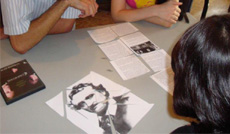

The name of a famous American writer, whose 200th birthday the world celebrates this year, is hidden in the title of the session. Guessed the name? Yes, it is Edgar Allan Poe, whose personality and workings remain enigmatic even for the 21 century readers. Some facts about his tragic life were read and discussed during the session. Copies of Poe’s poems Annabel Lee and Raven in his handwriting, photos of House of Edgar A. Poe and his grave in Baltimore, Maryland made the session more vivid and individuality of the poet more real for the participants.
111. October, 11. The tell-tale heart by Edgar Allan Poe
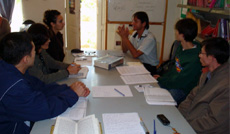 The tell-tale heart is a one of Poe’s masterpieces about mysteries of human nature. The story evoked a range of emotions and thoughts which readers discussed. After the discussion and analysis the participants listened to the tape with The tell-tale heart story narrated under the direction of Dr. Philip A. Turner. The artistic declamation together with sound effects added colors to the atmosphere.
The tell-tale heart is a one of Poe’s masterpieces about mysteries of human nature. The story evoked a range of emotions and thoughts which readers discussed. After the discussion and analysis the participants listened to the tape with The tell-tale heart story narrated under the direction of Dr. Philip A. Turner. The artistic declamation together with sound effects added colors to the atmosphere.
The books by E.A. Poe are available in our Resource Centre.
112. October, 18. Smithson and his deed
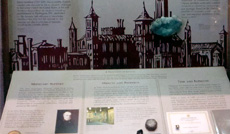
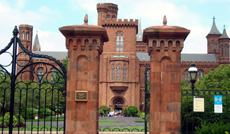
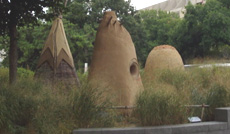
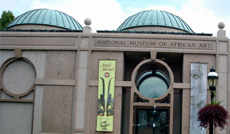
The session was dedicated to James Smithson and Smithsonian Institution, the organization founded in accordance with Smithson´s will. This action appeared to become the main deed of this British scientist: a number of museums and research centers were established to satisfy interest of Americans in history, culture,art and science. During the session different materials from a number of museums belonging to Smithsonian Institution were used.
113. October, 25. American Indian legends and music
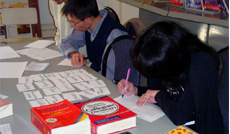 Numerous American Indian tribes created a great number of fairy tales which have become treasure of American Indian heritage. During the session participants read and analyzed a dramatic story A legend of Multnomah Falls created by Multnomah tribe, which live in Oregon, near Portland. The discussion was illustrated by photos of the magnificent Multnomah Falls. The other story for reading and discussing was Coyote, Iktome, and the Rock created by White River Sioux tribe. This fairy tale describes adventures of famous folklore tricksters and troublemakers, Coyote and Iktome.
Numerous American Indian tribes created a great number of fairy tales which have become treasure of American Indian heritage. During the session participants read and analyzed a dramatic story A legend of Multnomah Falls created by Multnomah tribe, which live in Oregon, near Portland. The discussion was illustrated by photos of the magnificent Multnomah Falls. The other story for reading and discussing was Coyote, Iktome, and the Rock created by White River Sioux tribe. This fairy tale describes adventures of famous folklore tricksters and troublemakers, Coyote and Iktome.
In the session the participants had also an opportunity to listen to Comanche’s flute music played by Doc Tate Nevaquaya.
114. November, 1. Day of the Dead
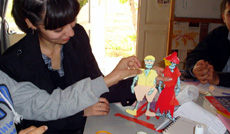 In spite of its sinister name, the Day of the Dead is a joyful holiday having its roots in Hispanic beliefs and religious traditions of indigenous inhabitants of America. Participants learnt about it while reading, asking and answering questions related to the holiday. They also learnt about a 19-century Mexican artist Jose Guadalupe Posada who created La Catrina, a lady skeleton, which has become a symbol of the Day of the Dead. After discussion the participants were asked to dress their Catrinas – paper skeletons. There was a lot of laughter during this session, and at the end of the session participants demonstrated masks of Death which they had made themselves.
In spite of its sinister name, the Day of the Dead is a joyful holiday having its roots in Hispanic beliefs and religious traditions of indigenous inhabitants of America. Participants learnt about it while reading, asking and answering questions related to the holiday. They also learnt about a 19-century Mexican artist Jose Guadalupe Posada who created La Catrina, a lady skeleton, which has become a symbol of the Day of the Dead. After discussion the participants were asked to dress their Catrinas – paper skeletons. There was a lot of laughter during this session, and at the end of the session participants demonstrated masks of Death which they had made themselves.
115. November, 8. The Library of Congress
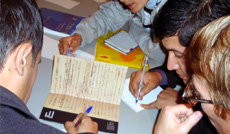 Inspiring the world with knowledge is the motto of the Library of Congress and participants were inspired by information about history of the Library, unique resources it possesses and a great number of services it provides.
Inspiring the world with knowledge is the motto of the Library of Congress and participants were inspired by information about history of the Library, unique resources it possesses and a great number of services it provides.
While doing different activities the participants used brochures from the Library of Congress and watched a CD-disc with interactive pages containing various information about the Library. The participants got lists of web-sites of the Library of Congress at the end of the session.
Explore the Library of Congress online.
The Library of Congress
www.loc.gov
More Than a Library
www.loc.gov/more/
National Book Festival
www.loc.gov/bookfest/
American Memory
www.loc.gov/memory/
THOMAS
www.loc.gov/thomas/
Global Gateway
www.loc.gov/international/
Online Catalog
http://catalog.loc.gov
The Cultures & History of the Americas
The Jay I. Kislak Collection at The Library of Congress
www.loc.gov/exhibits/kislak/
Churchill and the Great Republic
www.loc.gov/exhibits/churchill/
I Hear America Singing
http://www.loc.gov/rr/perform/ihas/
Song of America Tour
www.loc.gov/creativity/hampson/
Veterans History Project
www.loc.gov/vets/
Motion Picture and Television Reading Room
www.loc.gov/rr/mopic/
Recorded Sound Reference Center
www.loc.gov/rr/record/
America's Story from America's Library
www.loc.gov/americaslibrary/
The Learning Page
www.loc.gov/learn/
Today in History
www.loc.gov/ammem/today/
The Library of Congress - Poetry
www.loc.gov/poetry/
Poetry 180
www.loc.gov/poetry/180/
AmericasLibrary.kids.us
www.americaslibrary.kids.us
116. November, 15. My November guest
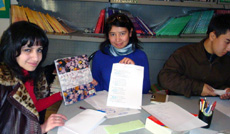 During this session participants read and analyzed Robert Frost’s poem My November guest. As entire Robert Frost’s poetry, this poem is not only about a certain season of the year and a peculiar mood this season is associated with, but first of all about complexity of human inner world and difficulty to find harmony within us. After analyzing the poem participants looked through an album Seasons. In this album Robert Frost’s poetry is accompanied by fantastic color photographs taken by Christopher Burkett in different parts of the USA.
During this session participants read and analyzed Robert Frost’s poem My November guest. As entire Robert Frost’s poetry, this poem is not only about a certain season of the year and a peculiar mood this season is associated with, but first of all about complexity of human inner world and difficulty to find harmony within us. After analyzing the poem participants looked through an album Seasons. In this album Robert Frost’s poetry is accompanied by fantastic color photographs taken by Christopher Burkett in different parts of the USA.
117. November, 22. It happened in Alabama
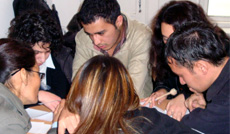 The session was dedicated to the 381-day bus boycott in Montgomery, Alabama in 1955. Participants started the session with reading and discussing the brief history of slavery in the USA. They were impressed with the brave action of Rosa Parks which marked the beginning of the Civil Rights Movement in the USA. Discussing the event the participants became aware that the unanimity the African American community demonstrated and the wisdom of Martin Luther King, who organized and led a non-violent protest, became essential steps in developing American democracy.
The session was dedicated to the 381-day bus boycott in Montgomery, Alabama in 1955. Participants started the session with reading and discussing the brief history of slavery in the USA. They were impressed with the brave action of Rosa Parks which marked the beginning of the Civil Rights Movement in the USA. Discussing the event the participants became aware that the unanimity the African American community demonstrated and the wisdom of Martin Luther King, who organized and led a non-violent protest, became essential steps in developing American democracy.
In the session brochures about the Montgomery bus boycott from Reginald F. Lewis Museum of Maryland African American History and Culture were used.
118. November, 29. Extreme nature
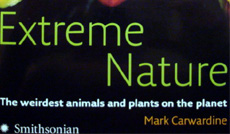
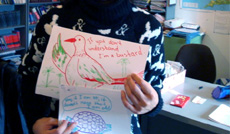
We often forget about wonders the generous nature creates everywhere. The album Extreme Nature published in collaboration with the Smithsonian Institution contains the breathtaking collection of facts and photos of the weirdest animals and plants on the planet. After reading amazing information about the smallest amphibian, the heaviest flying animal, the fastest growing plant, the highest jumper participants were asked to draw these animals and plants and only then they were shown real photos of these creatures.
The session was conducted by Gozzal Utemuratova.
119. December, 6. NASA: from earth to stars
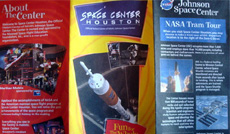 The session contained information about the history of NASA, the National Aeronautics and Space Administration, and different projects it has had. The participants read about 5 strategic enterprises implementing the agency’s activities and its 10 chief field installations, one of them, Lyndon B. Johnson Space Center, is located in Houston, Texas. While doing a number of activities and watching video the participants learnt about many striking successes and some tragedies NASA has experienced. The session was conducted by Kirill Madaminov.
The session contained information about the history of NASA, the National Aeronautics and Space Administration, and different projects it has had. The participants read about 5 strategic enterprises implementing the agency’s activities and its 10 chief field installations, one of them, Lyndon B. Johnson Space Center, is located in Houston, Texas. While doing a number of activities and watching video the participants learnt about many striking successes and some tragedies NASA has experienced. The session was conducted by Kirill Madaminov.
120. December, 13. America and its people: Abraham Lincoln
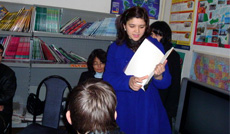 The session was dedicated to Abraham Lincoln and was based on a SCHOLASTIC series of books about childhood, family, years of self-education and work of the person who became the 16th American President and who led young American nation in the Civil War. During the session participants, divided into groups, managed to read, exchange and discuss information about Abraham Lincoln.
The session was dedicated to Abraham Lincoln and was based on a SCHOLASTIC series of books about childhood, family, years of self-education and work of the person who became the 16th American President and who led young American nation in the Civil War. During the session participants, divided into groups, managed to read, exchange and discuss information about Abraham Lincoln.
121. December, 20. America and its people: Life of slaves Frederick Douglass War Leaders: Grant and Lee
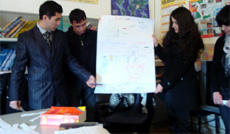
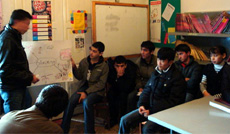
The session was about one of the most tragic pages of American history, the Civil War and people who did their best to preserve the American nation and to end slavery. Participants were expected to produce mini-projects by the end of the session. For this they were divided into 3 groups. The first group was reading the information about the life of slaves by the beginning of the Civil War. The group of ‘slaves’ not only made a presentation of their poster ‘Slavery’, but also performed a scene about a slavery auction. The second group, ‘historians’, was given a set of cards with various information about pre-, while-, and post-war facts and events. These participants were asked to categorize all the cards and make a poster with the most interesting facts. The third group was asked to read information about gigantic figures of that time: Frederick Douglas and two war leaders, General Robert E. Lee and General Ulysses S. Grant. These participants were also to make a poster.
All three groups demonstrated creativity and good knowledge of the topic while presenting their posters and answering questions of other participants.


